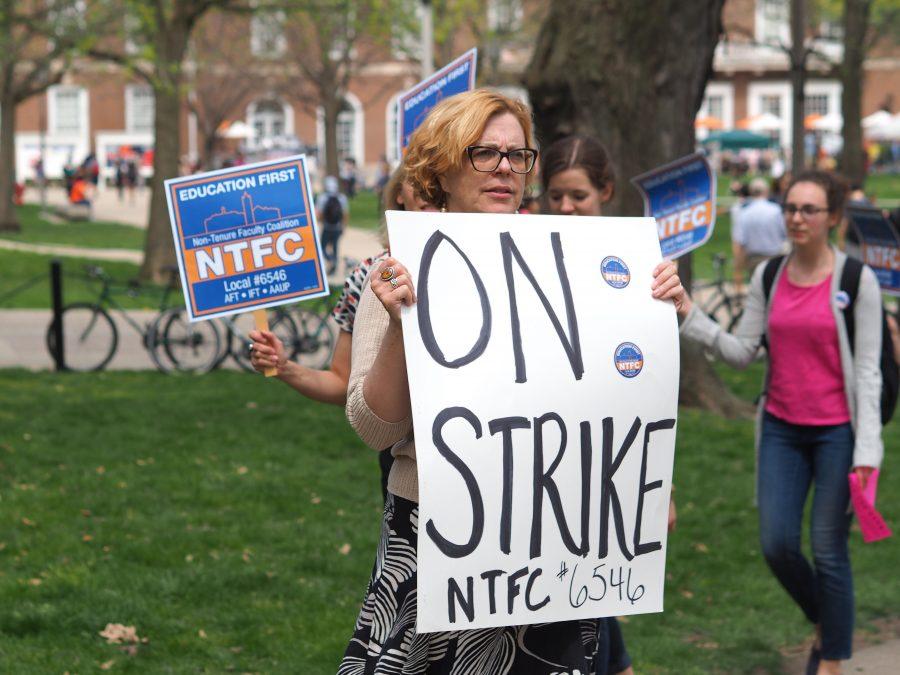Employee pay raises uncertain after federal court ruling
Students and faculty alike are found outside supporting the NTFC strikes outside of the English Building in Urbana, IL on Tuesday.
Last updated on Dec. 4, 2016 at 07:30 p.m.
The University is one of countless schools across the country scrambling after a federal court issued an injunction, which delayed changes to the Fair Labor Standards Act’s overtime exemption rule, which was set to take effect Dec. 1.
The rule would have increased the threshold for overtime eligibility from $23,660 annually to $47,476 annually. The University reviewed about 1,300 positions, including academic professionals, postdoctoral research associates and civil service employees. It slated some to become overtime-eligible and some to receive salary increases to meet the new threshold.
The increases would cost more than $3 million, but funding for post-doctoral research associates comes from multiple state and federal sources, according to University spokeswoman Robin Kaler.
The University Human Resources Department sent a massmail to faculty and staff announcing the suspension of the salary increases and changes in overtime eligibility while considering the court’s injunction.
Get The Daily Illini in your inbox!
This may be only temporary, as the University has not decided how it will proceed. Deb Stone, director of academic human resources, said the University is “stopping and pausing” with the changes while it waits for more information at a Council of Academic Professionals meeting Thursday.
“What we don’t know is whether it will be appealed, go through court process, how long it will take before we get some definitive information from the federal government, what may or may not happen after the presidential change,” Stone said. “There’s a lot we don’t know at the federal level.”
All affected employees were set to effect received notification, Stone said, but to varying degrees. At the University, a “large number” of academic professional staff received notices of notification of appointment, that reflected their new salaries before the injunction. But “very few” postdocs received them.
People who were supposed to be overtime-eligible under the new law were required to start tracking their time Nov. 20, two days before the injunction was announced, Stone said. The University will pay any overtime to those employees who worked during that week, but those employees reverted back to exempt or not eligible overtime status Nov. 27.
Stone said the University sees three options going forward: proceeding with raises and making about 600 people at the University newly eligible for overtime, continuing with raises only or stopping everything. Either way, the University needs to make a decision by Dec. 7, when employees are supposed to be paid.
“We have identified options, and we’ve had lots of conversations and consultations with faculty (principal investigators), unit heads, deans — particularly around area of postdoc research associates — and legal counsel for what our options are or are not,” Stone said. “Included in these conversations have been the president, vice president and provost to talk about, OK, what are our options, and which options are best for University of Illinois?”
Faculty members at the meeting expressed concern that the University would break contracts if it did not proceed with raises it notified employees of.
Billy Vermillion, a psychology academic adviser, said the wording of the letters employees received was “very definite and clear” that eligible faculty would receive a certain amount. The letters made no mention of contingencies or court challenges.
“In 20/20 hindsight, we would’ve included that language,” Stone said in response. “We never saw this coming.”
Katharine Schleich, a wetlands geology specialist with the state geological survey, said she received communication her raise was supposed to go into effect Nov. 16. She asked whether she would still receive the salary she was promised.
Stone said the University again has options for how to handle such situations. One is to proceed with the increases continuously despite the injunction. Another is to proceed with increases up until the date of the injunction. Yet another is to temporarily proceed with increases with the expectation that a resolution might come soon.
“It all really hinges on the legal decision on what our contractual obligations are,” Stone said.
The decision also depends on how other universities respond. Stone said Illinois State, Northern Illinois, Southern Illinois, Western Illinois and Eastern Illinois universities are stopping everything.
She said the University of Iowa and the University of Maryland have stopped everything after their state governments mandated them to do so. The University of Michigan and Purdue University have stopped all implementation, and the University of Wisconsin and Rutgers University have stopped all implementation beside changes for post-doctorals.
Schleich thinks continuing with the raises while other universities suspend theirs will bolster the University’s reputation.
“I mean I have a graduate degree, and to the federal government I don’t make enough to pay back my student loans” she said. “We’re talking about raising people to a standard. Whether or not that’s federal law, I think the University should look at whether or not it’s the right thing to do or not. I think to stay competitive as a university, we should be looking at ways to draw people to the University and ways to make them stay.”
Whatever decision the University makes, affected employees will receive notification in a more personal communication than a massmail, Stone said. The outcome remains uncertain, but the deadline is certain: Dec. 7.



